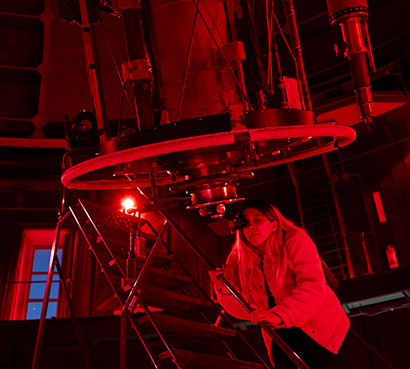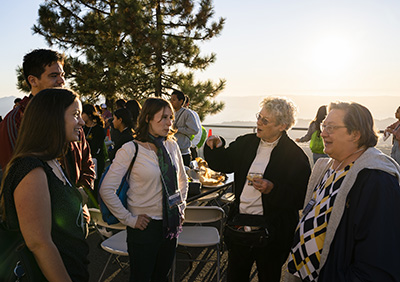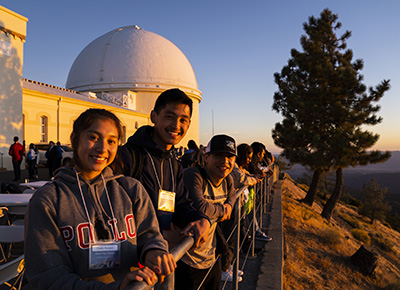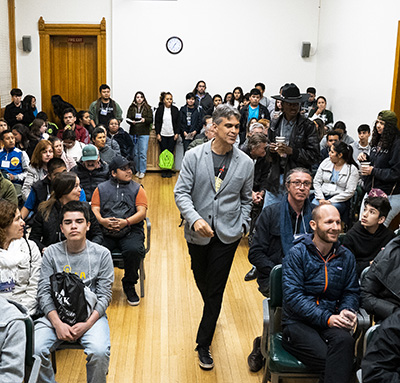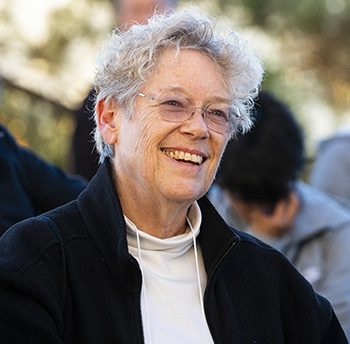UC's Lick Observatory held its third annual Spanish-language event, "La Noche de las Estrellas," on Saturday, October 5, giving students from seven regional high schools and their parents a rare opportunity to view the night sky through the observatory's telescopes and learn about astronomy from Spanish-speaking experts.
Spanish was spoken throughout the event, from welcome messages to lectures and hands-on time with the telescopes. Inviting Latinx students and their parents to learn about science in the language they're most comfortable with allows adults to participate and learn alongside their children, said event organizers.
David Koo and Sandra Faber, both professors emeriti of astronomy and astrophysics at UC Santa Cruz, started the program with the goal of showing Latinx students and their families that opportunities are available for them to learn about science and pursue careers in STEM fields (science, technology, engineering and math). Offering families a joint learning experience may improve the chances of a Latinx student getting support from their family to attend college and pursue a science degree, said Enrico Ramirez-Ruiz, a professor of astronomy and astrophysics at UCSC and one of the main speakers at the event.
"If a student goes home from school and tells their family about science, for some parents it just feels foreign," he said.
Koo noted that the Latinx community pursues STEM degrees at lower rates than many other minority groups. "There is often a gap between the aspirations of students and the expectations of their parents," he said. "We want to help close that gap."
Awe-inspiring
More than 100 participants in this year's event enjoyed an evening under the stars and the awe-inspiring experience of viewing the night sky through big telescopes. They were joined this year by new UCSC Chancellor Cynthia Larive and Campus Provost Lori Kletzer, as well as members of the Mexican Consulate General's office and University of Mexico faculty. The special guests provided insight and perspective to parents about the challenges and importance of pursuing higher education in science.
To identify students most likely to benefit from La Noche, the organizers reached out to each high school's Math, Engineering and Science Achievement (MESA) program, an elective program for underrepresented students interested in science. Alex Garlets, a MESA teacher and advisor at Soledad High School, accompanied his students to this year's La Noche event.
"They had a blast," he said, adding that the ride back to Soledad was filled with excited conversation as students exchanged stories from the night's adventure. A few even proclaimed they could see themselves pursuing a career that would enable them to look through telescopes, Garlets said.
The students' enthusiasm carried over into class on Monday, as those who had attended La Noche shared their experiences and excitement with their fellow classmates. "A large portion of students have already asked me if the field trip is going to happen again next year," Garlets said.
Feedback from the parents who attended was also positive, Faber said. One of the parents, while in conversation with her during the event, shared that it was her first time ever learning about science in Spanish, and that it gave her a new sense of empowerment.
Access to information
When Faber and Koo started La Noche de las Estrellas in 2016, one of their goals was to increase the amount of information available in Spanish to visitors to Lick Observatory. Recently, the observatory has begun adding QR codes on all of their displays and educational materials. These codes will enable visitors to access explanations in Spanish and other languages on their cell phones.
Situated atop Mt. Hamilton east of San Jose, Lick Observatory was founded in 1888 and continues to be a leading astronomical research facility. With headquarters on the UCSC campus, it is also used by astronomers from eight other UC campuses.
During La Noche, UCSC astronomers, including faculty and graduate students, were available to host students and parents as they were amazed by the moon and other objects viewed through telescopes of varying sizes, including the 40-inch Nickel Telescope, one of the observatory's research telescopes, as well as the historic 36-inch Great Lick Refractor. Smaller telescopes were set up by volunteer amateur astronomers outside the observatory's domes for additional viewing opportunities.
Faber and Koo started La Noche de las Estrellas with funding from a major research grant from the National Science Foundation. Recent donations provided by the Crary Family and Hal Hyde ensure that La Noche will continue for the next three years. If they can get additional funding, Faber and Koo plan to extend the reach of La Noche year-round by offering mentors to students and their families.
"One night isn't enough," Koo said. "Students need more ways to explore and learn about internship opportunities and college applications."
After three years, it's clear La Noche is a popular and successful event, and the organizers are ready to do more.
"My goal with all of this is to have happy, empowered kids," Faber said.
